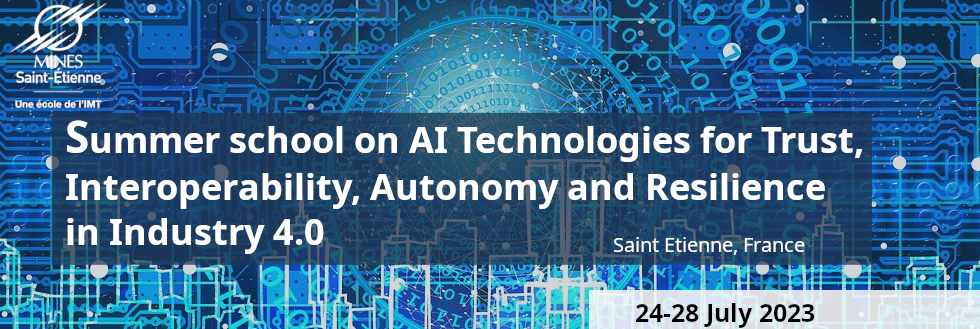
|
|
|
Keynotes
Keynote Web of Things (WoT)
by Michael McCool, Intel Corportation
Keynote Knowledge Graphs (KG)
Knowledge Graphs in the Real World - How Industry 4.0 Use Cases Benefit from Using Semantic Technologies [Slides]
by Daniel M. Herzig, Metaphacts
In this talk we discuss how Enterprise Knowledge Graphs and Linked Data help companies to build integrated data landscapes and rapidly build application on top of their Knowledge Graph. We will discuss real-world use cases in the pharma, life-sciences and engineering industry and focus in a live demo on how data models and applications can be build and used for model-driven applications in an Industry 4.0 use case.
Short Biography
Daniel Herzig-Sommer enables knowledge democratization & decision intelligence for customers by rolling out knowledge graph projects in large corporations using metaphactory. As COO at metaphacts, he is responsible for customer projects across industries with a focus on pharma, financial & engineering use cases. Daniel has 15+ years of experience with semantic and search technologies. He studied Business & Engineering at the Karlsruhe Institute of Technology (KIT), the University of Massachusetts-Amherst & Stanford University & holds a PhD in computer science from KIT.
Keynote Multi-Agent Systems (MAS)
Multi-agent Systems as a Key Enabling Technology to Distribute Intelligence in Industry 4.0
by Paulo Leitão, Polytechnic Institute of Bragrança
Global markets are imposing strong changing conditions for industrial companies running their businesses, facing strong pressures related to the quality, diversity and customization of products in high flexible and reconfigurable production systems. The fourth industrial revolution aims to promote the digitization of traditional industries, converting existing factories into intelligent and reconfigurable ones characterized by adaptability, efficiency, functionality, reliability, safety and usability. This digital transformation is also noticed in other domains like administration, electrical grids, transportation, healthcare and agriculture. In this context, smart products, processes and systems emerge of applying cyber-physical systems, complemented with the use of emerging ICT and Artificial Intelligence technologies, such as Internet of Things, Big data, cloud computing, machine learning, virtual/augmented reality and multi-agent systems.
This presentation discusses the use of multi-agent systems as a key enabling technology to realize intelligent, dynamic, self-organized and large-scale cyber-physical systems, aligned with Industry 4.0 principles. Since data and artificial intelligence are pillars in these emergent systems, the presentation highlights the use of multi-agent systems to distribute intelligence among the cloud to edge continuum, as well as the alignment of multi-agent systems with the RAMI 4.0 reference architecture and digital twins technology. Some illustrative examples of using multi-agent systems to deploy industrial cyber-physical systems exhibiting self-organization and intelligence features will be provided to emphasize their innovative aspect.
Short Biography
Paulo Leitão received the Ph.D. degree in Electrical and Computer Engineering from the University of Porto, Portugal, in 2004. From 1993 to 1999 he developed research activities at the CIM Centre of Porto, from 1999 to 2000 at IDIT - Institute for Development and Innovation in Technology, from 2009 to 2017 at LIACC - Artificial Intelligence and Computer Science Laboratory, and since 2018 at CeDRI – Research Centre in Digitalization and Intelligent Robotics, where he is its scientific coordinator. He joined the Polytechnic Institute of Bragança, Portugal, in 1995, where he is Full Professor at the Department of Electrical Engineering. He served as Head of the Department of Electrical Engineering from 2009 to 2015, Vice-President of Directive Board of School of Technology and Management from 2004 to 2009, President of the Pedagogical Council of School of Technology and Management during 2000 and Vice-President of Scientific Council of School of Technology and Management from 2001 to 2004.
His research interests are in the field of intelligent and reconfigurable systems, cyber-physical systems, multi-agent systems, digital twins, Internet of Things, factory automation and holonic systems. He participate / has participated in several national and international research projects, e.g. under the EU FP7 and H2020 frameworks, and Networks of Excellence. He is member of the International Program Committee (IPC) of several scientific events, and served as general co-chair of several international conferences, namely IFAC IMS’10, HoloMAS’11, IEEE ICARSC’16, SOHOMA'16 and IEEE INDIN’18. He has published 8 books and more than 350 papers in high-ranked international scientific journals and conference proceedings (per-review). He is co-author of three patents and received ten paper awards at international scientific conferences.
He is Senior member of the IEEE Industrial Electronics Society (IES) and Systems, Man and Cybernetics Society (SMCS), Chair of the IEEE IES Technical Committee on Industrial Agents, associate editor of IEEE Transactions on Industrial Informatics, member at-large of the IEEE IES Administrative Committee (AdCom), and chair of the established IEEE 2660.1-2020 standard.
Keynote Trustworthy and Responsible AI
Verifiable Machine Ethics [Slides]
by Louise Dennis, University of Manchester
Machine ethics is concerned with the challenge of constructing ethical and ethically behaving artificial agents and systems. One important theme within machine ethics concerns explicitly ethical agents – those which are not ethical simply because they are constrained by their programming or deployment to be so but which use a concept of ethics in some way as part of their operation. Normally this requires the provision of rules, utilities or priorities by a programmer, knowledge engineer or user. In this talk I will address the question of how such explicitly ethical programs can be constructed, how that construction can be determined to be correct, and what kind of errors might we find?

